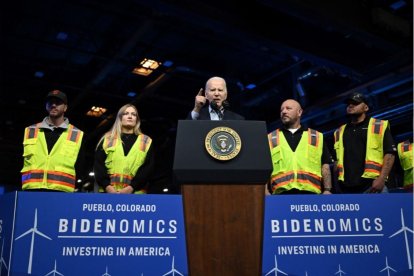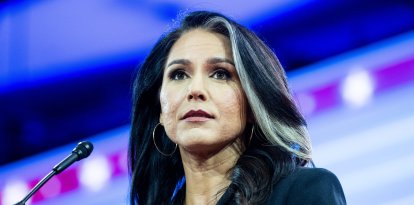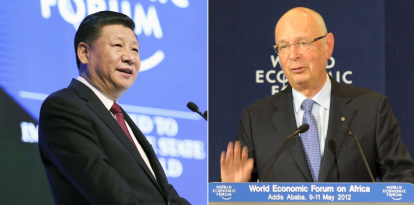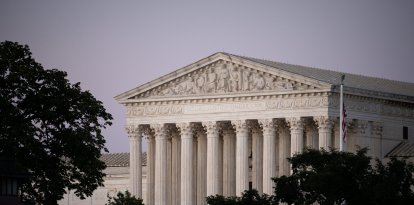Bidenomics II, the ultimate disaster?
Biden's potential re-election in November worries economists and business leaders, who fear that his second term would be even more ideologically driven and could harm the country's economy and domestic businesses.

(Photo by ANDREW CABALLERO-REYNOLDS / AFP)
Bidenomics has become one of the key terms in the upcoming presidential elections, despite the president's attempt to reframe its meaning. One of the main advantages Donald Trump has over Joe Biden is his ability to handle the economy, as well as security and immigration management. However, despite Trump's lead, the polls remain even. This raises a crucial question: Could the country's economy withstand a second term for Biden?
This is not a trivial question. While it is true that Biden took over the country in the midst of the serious crisis caused by the pandemic, his economic policies have often been driven more by ideological or political considerations than by sound economic principles, resulting in detrminental outcomes for the country. This perception is reflected in the polls, where voters express significant dissatisfaction with Biden's economic management, particularly concerning inflation and overall economic stability.
Biden's economic summary: Inflation and uncertainty
Nearing the end of his term, his financial balance sheet leaves much to be desired. As Stephen Moore summarized in the Boston Herald, over the past three years, Americans have dealt with:
The strategic petroleum reserve at 40-year lows
In addition, Biden sold more than 100 million barrels of oil from the country's strategic reserve, bringing it to its lowest level in the last 40 years. The decision has put the U.S. in a complicated situation regarding energy solvency and independence, undermining the reserve's original purpose of providing security in the event of war or extreme natural disasters. Moreover, Biden's simultaneous push for initiatives against oil companies and in favor of electric cars has mitigated any positive impact this measure might have had on the crude oil markets, further complicating the situation.
Costly populist measures
Another major milestones of Biden's administration has been the cancellation of student debt. Alhtough the Supreme Court initially overturned his measure, Biden has managed to implement partial cancellations totalling an impressive $167 billion dollars, benefiting among 4.75 million Americans. However, Biden's goal is to extend relief to 30 million people. Some critics have accused him of trying to buy votes from young people and from the middle and lower-class groups, who are drifting away from him in the polls, making this initiative a top priority for the president.
Experts warn that if Biden wins a second term, he might see his victory as an opportunity to push even more progressive policies. They warn that this could be disastrous for businesses and the economy. A report from the Freedom Economy Index recently revealed that half of small business owners believe their businesses "will not survive another four years of a Biden presidency."
Tax increases and more debt
In the event Biden is reelected, he will once again attempt to increase taxes "to those who have the most." So far, Congress has blocked these efforts during his current term. If he succeeds, experts predict that he could impose a 70% tax on profits, even if these match the initial investment. This could cause investors to move their funds to countries with lower taxes.
Kevin McCarthy's agreement to increase the national debt by $6 trillion left the president without sufficient funds for many social projects he claims are essential. These projects, including green energy initiatives, welfare benefits, and student loan bailouts, are estimated to cost an additional $2 trillion. Wit enough support in both chambers of Congress, Biden could use not only secure this funding but also raise the debt limit further without Republican opposition.
Biden wants to build a "zero-emissions" country
One of the sectors that is most concerned about Biden's possible second term is the energy industry, especially fossil fuels. This industry has begun to donate massively to Donald Trump. However, the reality is that the U.S. continues to get between 70% and 80% of its energy from oil, gas, coal and diesel.
Far from being daunted, Biden renewed his commitment to achieve a "zero emissions" energy system, eliminating fossil fuels altogether and making electricity the country's main grid. Biden insists that this task is urgent and would require doubling the capacity of the power grid, which is already suffering brownouts in "green" states like California. Moreover, Moore points out that it would provoke a strategic weakness by entrusting the entire national economy to a single energy source. In addition, it would cause "the cost of heating to double or triple."
Unions in power
In addition, businessmen also fear that Biden will bring back his PRO Act, which would give overwhelming weight to unions in the states, even in Republican states. The president's team has also contemplated implementing a stricter competition policy to limit big business, starting with mergers. One of his big goals is that a large part of his program will be financed by large firms and big fortunes in order to redistribute wealth.
All of this makes people believe Biden's re-election slogan, "we can finish the job" is a threat and that the United States will be "finished" if he wins a second term.
RECOMMENDATION





















